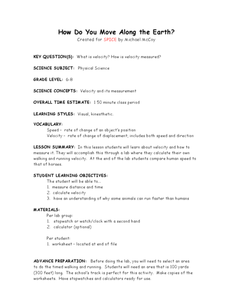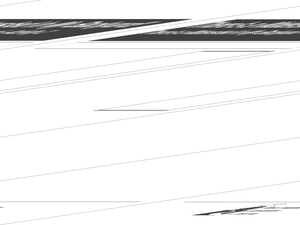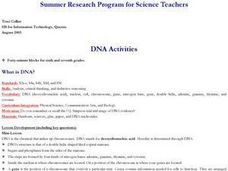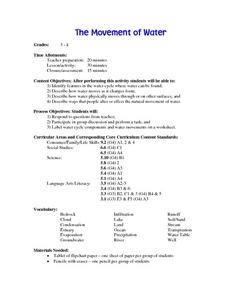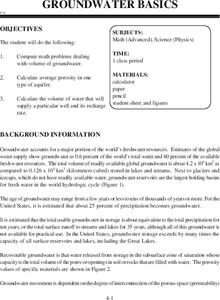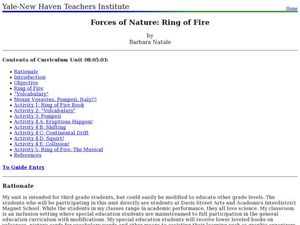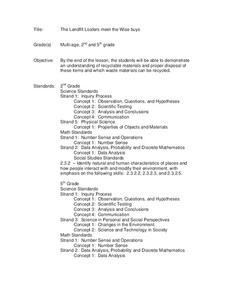Curated OER
Indoor Air Quality
Young scholars make a work puzzle using air quality vocabulary. In this air quality vocabulary lesson, students design a word puzzle using a teacher designated number of vocabulary words. They peer edit the puzzles with their classmates.
Curated OER
100 Years of Flight
Students investigate Bernoulli's principle of air pressure and how it
relates to the lift of an airplane. Students identify various Aeronautical vocabulary terms. Students construct a paper glider and experiment with the control surfaces...
Curated OER
Experiments with Photovoltaic Cells
Pupils explain how sunlight is converted to electricity. In this series of physics lesson, students study how varying the characteristics of the light source affect photovoltaic cells. They research their different uses in other countries.
Curated OER
How Do You Move Along the Earth?
Students determine their own walking and running velocity. In this physics lesson, students calculate velocity using distance and time information. They compare human and animal speeds.
Curated OER
Forces and Energy Study Guide
Sixth graders use prior knowledge to create a tri-fold study guide using Microsoft Publisher (if available). They include real world examples that show balanced and unbalanced forces, kinetic and potential energy, and vocabulary. The...
Curated OER
There's a Watershed in my Backyard!
Students explain what the term watershed is by creating a model. For this science, geography lesson, students demonstrate how the water moves in a watershed. Additionally, students learn about point source and nonpoint source pollution....
Curated OER
DNA Activities
Students work together to identify the structure of DNA. They practice using new vocabulary as well. They create a 3-D model of DNA to complete the lesson.
Curated OER
Magnets
Students explore the science of magnets and how magnets work. They conduct a series of fun experiments and magnetize objects and demonstrate how magnetism operates right through other materials.
Curated OER
Children's Literature Across the Curriculum Ideas-The Gadget War
Students read The Gadget War by Betsy Duffey. They complete a variety of cross-curricular activities surrounding inventors and inventions. Included are reading, art, math, science, writing, social studies, and library connections.
Curated OER
Work and Power Crossword Puzzle
For this work and power worksheet, students complete a crossword puzzle containing 12 vocabulary terms related to work and power.
Curated OER
Work and Power Crossword Puzzle Answers
In this work an power instructional activity, students are provided with the answers to the 12 crossword clues about vocabulary pertaining to work and power.
Curated OER
Is Shep Sherman Innocent or Guilty?
Learners engage in this activity to use knowledge acquired in this unit to predict the outcome of the trial in Science Court. The students will then publish their predictions on Microsoft Word.
Curated OER
A New Phase In Town
Middle schoolers explore heat energy and how it is used to change the phase of matter, and discover that temperature does not increase or decrease until the phase change is complete. This extremely well-written plan is packed with great...
Consortium for Ocean Science Exploration and Engagement (COSEE)
Arctic Smorgasbord
Though the walrus spends roughly one third of its time on land, it eats organisms that live on the bottom of the ocean. The first in a series of five, the lesson uses a variety of plant and animal cards to have scholars build an arctic...
Curated OER
Breaking it Down
High schoolers will identify the factors that contribute to erosion and weathering. They will start by differentiating between chemical and mechanical weathering. They then apply what they learned by playing the online jeopardy game. Key...
Curated OER
Solid Waste Recycling
Students seek scientific and technological solutions to envrionmental problems. They record class activities in a journal. They identify relationships among living things and their environments.
Cornell University
Buoyancy
Swimmers know to float by turning their bodies horizontally rather than vertically, but why does that make a difference? In an interesting lesson, scholars explore buoyancy and the properties of air and water. They test cups to see which...
Curated OER
The Movement of Water
Here is an excellent lesson plan on the water cycle and the states in which water exists. Learners identify the features of the water cycle, describe how water changes form, and look at ways that people affect the natural movement of...
Curated OER
Groundwater Basics
Groundwater is an essential natural resource, not to mention a fascinating topic to study. Here is a series of twelve amazing lessons on the water source and how we use it in our daily lives. Concepts require higher math and physics...
Cornell University
Splitting Water with Electricity
Explore how electricity splits water molecules into hydrogen and oxygen. Learners begin by calculating the voltage necessary to separate the water. They then perform the experiment and measure the ratio of hydrogen and oxygen bubbles.
Purdue University
Design of a Door Alarm
How does electricity work? Budding scientists explore the concepts of electrical currents and open and closed circuits with class discussion and a hands-on activity using a battery to turn on a light bulb. Learners also make predictions...
Cornell University
The Galvanic Cell Game
Play a little game with your classes! Young scholars expand on their understanding of oxidation/reduction reactions in a game-based activity. They build a Galvanic cell with game pieces while learning about each component and their...
Curated OER
Forces of Nature: Ring of Fire
Third graders will research the Ring of Fire and be able to share their findings with their partner. They will also demonstrate volcanic eruptions using a baking soda and vinegar volcano model. Then they will discover how continental...
Curated OER
The Landfill Loafers Meet the Wise Buys
Students discover recyclable materials and the proper disposal of those items through Internet research. Working in groups of four, they search the Internet for uses of recyclable materials. After research is complete, they participate...



